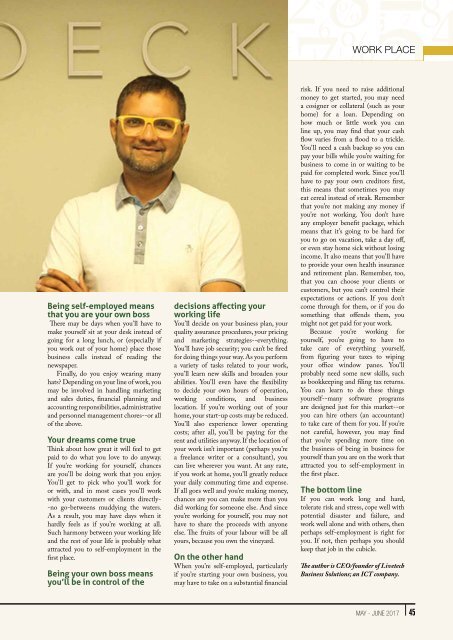The Accountant-May-June 2017
Create successful ePaper yourself
Turn your PDF publications into a flip-book with our unique Google optimized e-Paper software.
WORK PLACE<br />
Being self-employed means<br />
that you are your own boss<br />
<strong>The</strong>re may be days when you’ll have to<br />
make yourself sit at your desk instead of<br />
going for a long lunch, or (especially if<br />
you work out of your home) place those<br />
business calls instead of reading the<br />
newspaper.<br />
Finally, do you enjoy wearing many<br />
hats? Depending on your line of work, you<br />
may be involved in handling marketing<br />
and sales duties, financial planning and<br />
accounting responsibilities, administrative<br />
and personnel management chores--or all<br />
of the above.<br />
Your dreams come true<br />
Think about how great it will feel to get<br />
paid to do what you love to do anyway.<br />
If you’re working for yourself, chances<br />
are you’ll be doing work that you enjoy.<br />
You’ll get to pick who you’ll work for<br />
or with, and in most cases you’ll work<br />
with your customers or clients directly-<br />
-no go-betweens muddying the waters.<br />
As a result, you may have days when it<br />
hardly feels as if you’re working at all.<br />
Such harmony between your working life<br />
and the rest of your life is probably what<br />
attracted you to self-employment in the<br />
first place.<br />
Being your own boss means<br />
you’ll be in control of the<br />
decisions affecting your<br />
working life<br />
You’ll decide on your business plan, your<br />
quality assurance procedures, your pricing<br />
and marketing strategies--everything.<br />
You’ll have job security; you can’t be fired<br />
for doing things your way. As you perform<br />
a variety of tasks related to your work,<br />
you’ll learn new skills and broaden your<br />
abilities. You’ll even have the flexibility<br />
to decide your own hours of operation,<br />
working conditions, and business<br />
location. If you’re working out of your<br />
home, your start-up costs may be reduced.<br />
You’ll also experience lower operating<br />
costs; after all, you’ll be paying for the<br />
rent and utilities anyway. If the location of<br />
your work isn’t important (perhaps you’re<br />
a freelance writer or a consultant), you<br />
can live wherever you want. At any rate,<br />
if you work at home, you’ll greatly reduce<br />
your daily commuting time and expense.<br />
If all goes well and you’re making money,<br />
chances are you can make more than you<br />
did working for someone else. And since<br />
you’re working for yourself, you may not<br />
have to share the proceeds with anyone<br />
else. <strong>The</strong> fruits of your labour will be all<br />
yours, because you own the vineyard.<br />
On the other hand<br />
When you’re self-employed, particularly<br />
if you’re starting your own business, you<br />
may have to take on a substantial financial<br />
risk. If you need to raise additional<br />
money to get started, you may need<br />
a cosigner or collateral (such as your<br />
home) for a loan. Depending on<br />
how much or little work you can<br />
line up, you may find that your cash<br />
flow varies from a flood to a trickle.<br />
You’ll need a cash backup so you can<br />
pay your bills while you’re waiting for<br />
business to come in or waiting to be<br />
paid for completed work. Since you’ll<br />
have to pay your own creditors first,<br />
this means that sometimes you may<br />
eat cereal instead of steak. Remember<br />
that you’re not making any money if<br />
you’re not working. You don’t have<br />
any employer benefit package, which<br />
means that it’s going to be hard for<br />
you to go on vacation, take a day off,<br />
or even stay home sick without losing<br />
income. It also means that you’ll have<br />
to provide your own health insurance<br />
and retirement plan. Remember, too,<br />
that you can choose your clients or<br />
customers, but you can’t control their<br />
expectations or actions. If you don’t<br />
come through for them, or if you do<br />
something that offends them, you<br />
might not get paid for your work.<br />
Because you’re working for<br />
yourself, you’re going to have to<br />
take care of everything yourself,<br />
from figuring your taxes to wiping<br />
your office window panes. You’ll<br />
probably need some new skills, such<br />
as bookkeeping and filing tax returns.<br />
You can learn to do these things<br />
yourself--many software programs<br />
are designed just for this market--or<br />
you can hire others (an accountant)<br />
to take care of them for you. If you’re<br />
not careful, however, you may find<br />
that you’re spending more time on<br />
the business of being in business for<br />
yourself than you are on the work that<br />
attracted you to self-employment in<br />
the first place.<br />
<strong>The</strong> bottom line<br />
If you can work long and hard,<br />
tolerate risk and stress, cope well with<br />
potential disaster and failure, and<br />
work well alone and with others, then<br />
perhaps self-employment is right for<br />
you. If not, then perhaps you should<br />
keep that job in the cubicle.<br />
<strong>The</strong> author is CEO/founder of Livetech<br />
Business Solutions; an ICT company.<br />
MAY - JUNE <strong>2017</strong> 45

















